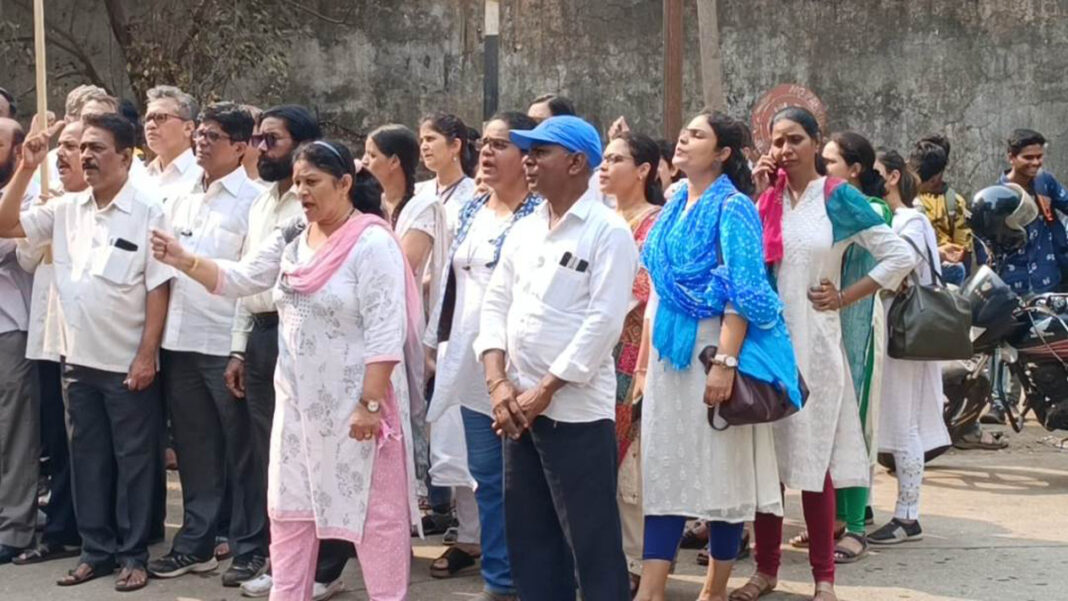INDIA: Although demand for Old Pension Scheme (OPS) is gaining ground once again, and some states are in the process of implementing it, with a heavy burden on the Government treasury, due to increasing life expectancy, the scheme has become unsustainable.
According to the Central Government, if the OPS has to be implemented, it will add a burden of Rs 1,10,000 crore, leading to the bankruptcy of states, and since there is no corpus specifically for the pension, the burden will grow continuously.
Rajasthan, Chhattisgarh, and Jharkhand governments have switched to OPS, and Punjab is in the process of implementing it. The Centre has refused to return the accumulated corpus of subscribers under the New Pension Scheme (NPS) saying that there is no provision under law to refund the NPS funds to any of the state governments.
According to them, when the right time comes, only then will this money be given to the employees. As such, even if the states go ahead with the implementation of the OPS overly enthusiastically, the effort is certain to receive a setback.
Perk
The promise of a pension and a family pension after retirement was a perk for accepting a government job earlier. However, now the situation has changed drastically, and the OPS is proving to be a white elephant.
However, given the repeated demand, the Central Government has given a one-time option of switching back to the OPS till August 31.
Only those central government employees (except the armed forces) who joined the service before the December 22, 2003, notification for NPS will be given the option of being covered under the CCS (Pension) Rules, 1972 (now 2021). This is as per a notification dated March 3, 2003, from the Department of Pension and Pensioners’ Welfare.
Earlier situation
Under OPS, a 12 percent amount was deducted from employees’ salaries with the Government’s matching contribution of 12 percent. Of this amount, 8.33 percent was diverted to the employee pension scheme, and 3.67 percent was retained for the provident fund. The employees were required to contribute to the PF for 15 years or put in ten-year service.
Earlier Pension
Government employees used to get 50 percent of the last salary drawn as a pension per month after retirement. Besides, they used to get 1/4th of a month’s Basic Pay plus Dearness Allowance for each completed six monthly periods of qualifying service (a minimum of 5 years) as a one-time retirement gratuity.
However, the OPS was scrapped by the NDA government in December 2003, and the NPS came into effect on April 1, 2004.
Situation now
Under the NPS, employees are required to make a monthly contribution of 10 percent of their salary. A matching contribution is made by the government. Starting April 1, 2019, the employer’s contribution rate has been enhanced to 14 percent for central government employees. Both these contributions are held in a non-withdrawable account.
While the NPS is mandatory for government employees, private-sector employees can also join it. All citizens between the ages of 18 and 65 are eligible for NPS.
Under the NPS, after retirement, an employee can withdraw 60 percent of the corpus on maturity which is tax-free. For regular income or pension, the employee is required to invest the remaining 40 percent in taxable annuities.
While a lump sum withdrawal of 60 percent is a big amount, the employees are secured only if they reinvest this amount. Still, the returns do not match what OPS offers.
Investment
In NPS, the contribution deducted from the salary is invested in market-linked instruments. The investment in NPS up to Rs 1.50 lakh is tax-deductible under Section 80C of the Income Tax Act, 1961. Additional annual investment up to Rs 50,000 is tax-deductible under Section 80CCD (1B) of the Act.
Although it is considered that the employees are in control of their destiny, the fact remains that the market-linked returns are uncertain. This is the reason a majority of government employees are opposed to the NPS.
Maharashtra
In Maharashtra, nearly 18 lakh employees including nearly 8 lakh teaching and non-teaching staff recently observed a week-long strike to demand the reversal to OPS.
The strike was withdrawn following an assurance from Chief Minister Eknath Shinde. The Maharashtra government has also set up a three-member secretary-level committee to work out a solution to this vexed issue.
The ex-MPs are entitled to receive a monthly pension of Rs 25,000 for a 5-year term. They are privileged to receive an additional Rs 2,000 for every year served as an MP over the five years.
The Union Government spends Rs 70.50 crore on monthly pensions. The beneficiaries include even industrialists and film stars.
In Maharashtra, on completion of 5 years, the MLAs are entitled to a monthly pension of Rs 50,000/- after 5 years (after 6 years for the members of the legislative council). If the MLA is re-elected, then Rs 2,000 per year of service is added. If the MLA passes away, the next of kin receive a pension of Rs 40,000 per month.
As of today, Maharashtra spends Rs 6 crore per month towards pension to 812 ex-legislators ( 668 MLAs/144 MLCs) and 503 family members of the late legislators. The pension amount paid to legislators differs from state to state.
However given the mounting burden, by and large the retirement pension is expected to be an unsustainable and a social security of the past.
Also Read: Mumbai Police Seizes Narcotic Drugs Worth Rs 10 Crore



